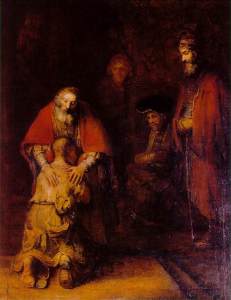“And while he was still a long way off, his father saw him coming. Filled with love and compassion, he ran to his son, embraced him, and kissed him.” –Luke 15:20
I’d like to share with you a snippet of a recent conversation I had with God.
It started when I wanted to write the way Jesus portrayed God in Luke 15. After the wayward son spent his inheritance on wild living, he decides to return home. Verse 20 says the Father ran to the son, embraced him before he could deliver his well-rehearsed speech, and called for a party on his behalf. But I was missing  something in the story and didn’t know how to start. I had blogger’s block. Finally (why is it always “finally’?), I settled myself down and prayed.
something in the story and didn’t know how to start. I had blogger’s block. Finally (why is it always “finally’?), I settled myself down and prayed.
Me: Lord, as I think about Luke 15, how would You like me to represent You?
God: Tell people My forgiveness predates their repentance.
Me: Okay. What is the best way to do that?
God: Tell them why I ran.
I’ve been studying Luke 15 since the 1980’s when I first read Lloyd John Oglivie’s book on the parables called The Autobiography of God. The first parable Oglivie writes about is this one, which he calls, “The Prodigal God.” About the Father he says, “Rivet your attention on him. Don’t take your eyes off him,” because the spotlight is never off Him, even when He is off stage. He is the prodigal God.
That strikes most people as absurd, mostly because they think prodigal means “going away and returning.” In fact, the word “prodigal” means extravagant, lavish, unrestrained and copious. True, this describes the son in the way he lived in the far country, but it better describes the father. His love knew no limits, his joy no restraint, his forgiveness no boundaries. His forgiveness isn’t even bound by time. The son was unrestrained with his money, but the father is unrestrained with His love.
Back to the parable. The son is now walking through town on his way to the Father’s house and Jesus says, “While he was still a long way off, his father saw him coming. Filled with love and compassion, he ran to his son, embraced him, and kissed him.”
Let’s pause at that word “run.” Most of us skip over it and move ahead to the embrace and the call for a new wardrobe. But if we don’t stop and consider the Father running, we miss a very important part of the story.
In his exegesis of Luke 15, Kenneth Bailey tells us as the son approaches the village, a crowd will gather. The village, well aware the son wanted the father to die so he could have his money now, will taunt the son, abusing him verbally and possibly physically. Therefore, the only way for the father to protect his son from a distance was to draw the attention of the crowd away from the son and onto himself. Therefore, the father ran.
Bailey writes, “An Oriental nobleman with flowing robes never runs anywhere. To do so is humiliating.” Aristotle wrote, “Great men never run in public.” But the father ran anyway. Why? Because he had “compassion” for his son. The only way to keep the crowd from harming his son was to distract them, so the father runs this gauntlet, drawing the attention of the away from the son in order to observe the father’s shameful behavior. Bailey writes, “The boy, having steeled his nerves for this gauntlet, now, to his utter amazement, see his father run it for him. Rather than experiencing the ruthless hostility he deserves and anticipates, the son witnesses and unexpected, visible demonstration of love in humiliation.”
 This is the character of God. Not concerned for His own dignity, He does the unexpected so those who would never expect it see a side of God they least expected: love in humiliation. This is Christ the Messiah who, more concerned with our salvation than His dignity, voluntarily hangs naked from a Cross. Why? “Because of the joy awaiting him, he endured the cross, disregarding its shame” (Heb. 12:2).
This is the character of God. Not concerned for His own dignity, He does the unexpected so those who would never expect it see a side of God they least expected: love in humiliation. This is Christ the Messiah who, more concerned with our salvation than His dignity, voluntarily hangs naked from a Cross. Why? “Because of the joy awaiting him, he endured the cross, disregarding its shame” (Heb. 12:2).
While we were disabled due to sin, Jesus disrobed, shedding both His eternity and His clothes, to enable us to live again. Like the father running in the parable, he took the shame upon Himself and drew Satan’s attention away from us, knowing His death would set us free. By the time the Accuser figured out the resurrection, Christ’s victory over sin and death had already been won.
Our Savior exchanged his majesty for mortality, His sovereignty for shame, His glory for a grave. At the best possible moment in the history of humanity upon this earth, Christ came to us. Even as a baby, Satan’s attention was riveted upon Him. Christ ran.
We’ve been created by a Father who runs toward us. In His compassionate love, He forgives us before we ask, before we can convince Him we need His presence with our well-rehearsed speech. All the Father knew was His child who once was lost is now returning home, so He ran to embrace him.
Our Father, Holy is His name, likes to run. Have you experienced His embrace?

Rembrandt, The Return of the Prodigal Son, 1662–1669
 The late night call to Barbara and me in Baton Rouge came from my mom in Mississippi telling me my dad in California was dying of cancer. Although I had only seen him once in almost twenty years, I knew I needed to fly to California to be with him. The next day I asked for a week off from work, booked a flight to LAX and stayed with my friends Gary and Cece in Garden Grove. The next day I drove Cece’s car to my hometown of Thousand Oaks, CA to spend the week with my dad in the hospital.
The late night call to Barbara and me in Baton Rouge came from my mom in Mississippi telling me my dad in California was dying of cancer. Although I had only seen him once in almost twenty years, I knew I needed to fly to California to be with him. The next day I asked for a week off from work, booked a flight to LAX and stayed with my friends Gary and Cece in Garden Grove. The next day I drove Cece’s car to my hometown of Thousand Oaks, CA to spend the week with my dad in the hospital.



